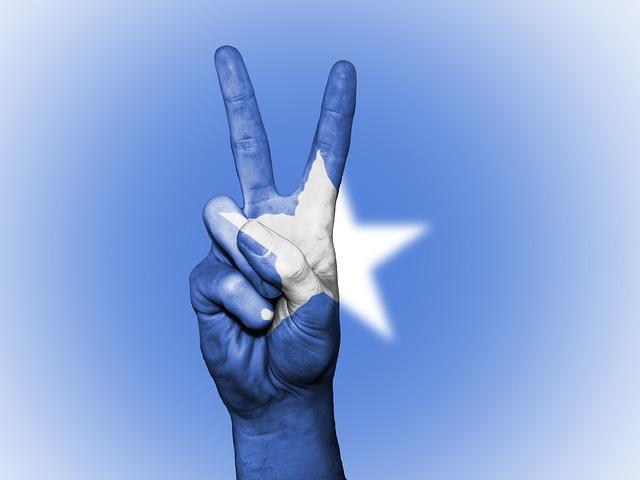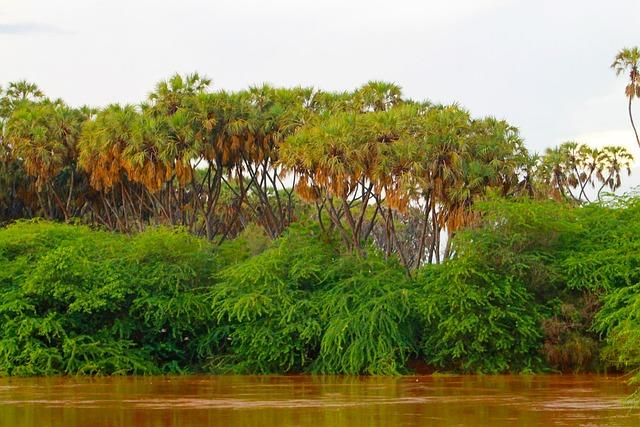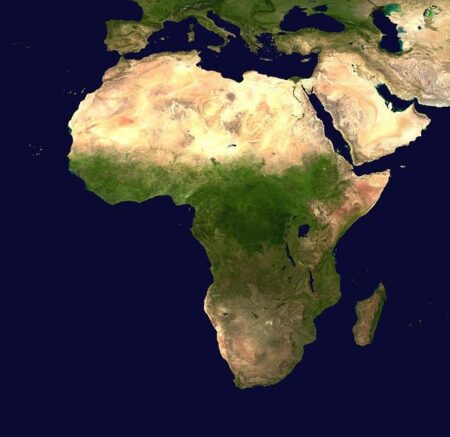Introduction
In recent years, the Red Sea has emerged as a geopolitical hotspot, with increasing competition and strategic maneuvering among regional and global powers. At the heart of this tumult lies Somalia, a nation whose long-standing vulnerabilities are now exacerbated by external pressures and internal strife. As various actors vie for influence in the region, Somalia finds itself at a precarious crossroads, grappling with the implications of shifting alliances and the entrenchment of rival interests.This article delves into the complex dynamics shaping Somalia’s position within the Red Sea arena, exploring the effects of heightened tensions on its domestic landscape, security, and governance. Understanding these multifaceted interactions is crucial for grasping the broader implications for stability in the Horn of Africa and beyond.
Somalia’s Strategic Position in Red Sea Geopolitics
Somalia’s geographic location makes it a pivotal player in the shifting dynamics of geopolitics in the Red Sea region. Bordered by the Gulf of Aden to the north and the Indian Ocean to the east, the country serves as a crucial maritime passage for international shipping routes. Key global stakeholders, particularly those from China, the United States, and the Gulf states, are increasingly focused on Somalia as they seek to exert influence and secure strategic partnerships. The growing competition for dominance in these waters is prompting regional powers to enhance military and economic engagements in the Horn of Africa, often resulting in a complex web of alliances, rivalries, and interventions.
This strategic competition, however, does not come without domestic consequences. The influx of foreign interests can exacerbate existing tensions within Somalia, often polarizing local communities and straining governance structures. As various factions vie for control, issues such as piracy, insurgency, and resource exploitation remain pressing concerns. The potential for foreign military bases in Somalia also raises questions around sovereignty and national identity. Key implications for Somali society might include:
- Increased militarization leading to heightened conflict prospects.
- Economic dependency on foreign investments with little benefit to local communities.
- Political fragmentation arising from competing interests of local and foreign powers.

Impact of Regional Rivalries on Somalia’s Domestic Affairs
The complex tapestry of regional rivalries in the Horn of Africa has a profound effect on Somalia’s domestic affairs. Several neighboring countries, including Ethiopia and Kenya, as well as external powers like the United Arab Emirates and Turkey, vie for influence within Somalia. This competition has far-reaching implications for security, political stability, and economic growth. Militia groups and political factions often align themselves with regional states, effectively outsourcing their loyalty in exchange for support, funding, or military assistance. This alignment complicates local governance and often leads to a cycle of violence, undermining efforts toward national reconciliation and stability. Key issues stemming from these rivalries include:
- Resource Allocation: Competition for access to lucrative resources, including ports and fishing grounds.
- Militia Financing: External funding of local groups that perpetuate violence.
- Political Disunity: Fragmentation of political entities that dilute national unity.
Moreover, the impact of these rivalries extends to the socioeconomic landscape of Somalia. This influence manifests in the increased militarization of local politics, whereby political leaders cultivate relationships with foreign powers to secure arms and resources. Corruption and nepotism thrive in this environment, as leaders prioritize personal gain over public service. The resulting socioeconomic challenges are exacerbated by unemployment, poverty, and displacement, which together create fertile ground for extremist ideologies to take root.The following table illustrates some of the major regional players and their perceived interests in Somalia:
| country/Entity | Interest in Somalia |
|---|---|
| Ethiopia | Stabilizing regional influence and countering Islamic extremism. |
| Kenya | Securing borders and mitigating threats from Al-Shabaab. |
| UAE | Expanding economic ties and establishing military bases. |
| Turkey | Increasing humanitarian aid and soft power influence. |

Piracy and maritime Security: Challenges in the red Sea
The Red Sea has become a hotspot for maritime security challenges,particularly exacerbated by persistent piracy emanating from the Somali coast. This region’s intricate geopolitical landscape complicates efforts to combat these threats. pirates leverage the proximity of shipping lanes to launch attacks, targeting commercial vessels that traverse this critical waterway. In response, international forces have intensified naval patrols, but the effectiveness of these measures remains uncertain, raising questions about long-term strategies for ensuring safe passage for maritime trade.
Moreover, the rise of piracy has significant domestic implications for Somalia.The influx of foreign military presence often leads to strained relations, intensifying nationalist sentiments among coastal communities. Local economies, heavily reliant on fishing and trade, suffer as shipping companies either avoid the region or impose higher insurance costs, impacting livelihoods.The intricate balance between enhancing maritime security and fostering local economic stability underscores the need for comprehensive solutions that address both piracy and the underlying conditions that fuel it.

Economic Opportunities and Risks for Somalia in Global Trade
With its strategic location along the Red Sea and the Gulf of aden, Somalia stands at a vital crossroads of international trade.This offers a range of economic opportunities that could propel the country toward recovery and growth. Key potential benefits include:
- Increased Shipping Activity: Expanding port infrastructure could boost trade volume and attract foreign investments.
- Access to International Markets: Improved logistics may facilitate exports of Somali goods, such as seafood and livestock, enhancing foreign income.
- Foreign Direct Investment (FDI): Stability in the region might entice foreign investors to tap into Somalia’s untapped natural resources.
though, the interplay of regional tensions alongside global economic dynamics poses significant risks. These challenges could undermine trade efforts and engender economic instability, exemplified by:
- Geopolitical Strife: Ongoing conflicts and rivalries among Red Sea nations may disrupt shipping lanes and deter investment.
- Economic Turbulence: Fluctuating global markets can lead to instability in commodity prices, impacting Somalia’s export revenues.
- Domestic Challenges: Political instability and infrastructural inadequacies could hinder the country’s ability to fully participate in global trade.
| Economic Opportunities | Risks |
|---|---|
| Increased Shipping Activity | Geopolitical Strife |
| Access to International Markets | Economic Turbulence |
| Foreign Direct Investment (FDI) | Domestic Challenges |

Recommendations for Strengthening Somalia’s Political Stability
to enhance political stability in Somalia,a multifaceted approach is vital,focusing on both internal cohesion and external diplomatic engagement. Addressing the root causes of conflict is paramount, including issues related to governance, resource distribution, and clan dynamics. Implementing reform initiatives such as:
- Decentralization of power to empower local governance structures
- Strengthening civil society organizations to foster community dialog
- Promoting inclusive policies that ensure representation of marginalized groups
Moreover, Somalia’s foreign relations should pivot towards creating strategic partnerships that not only bolster security but also promote economic development. This can include:
- Engaging neighboring countries in regional security frameworks
- Attracting foreign investment through stability assurances
- Collaborating with international organizations for capacity building in governance
Establishing an effective policy matrix that incorporates domestic needs while navigating the complex geopolitical landscape in the Red Sea region is essential for Somalia’s enduring peace and stability.

Engaging the International Community: A Path Forward for Somalia
In a rapidly evolving geopolitical landscape,engaging the international community is crucial for somalia to stabilize and thrive amid external tensions. A strategic approach requires Somalia to:
- Leverage Global Partnerships: Strengthening ties with key international stakeholders, including regional powers and global organizations, can provide essential support and resources.
- Promote Transparency: maintaining an open dialogue about domestic policies and their regional impact helps gain trust and alleviate fears about Somalia’s intentions.
- Facilitate Multilateral Cooperation: Collaborating on issues like maritime security and anti-piracy initiatives positions Somalia as a proactive player in the Red Sea arena.
Moreover, Somalia must prioritize its domestic unity to effectively engage with external entities. This involves:
- Strengthening Governance: Developing inclusive governance structures ensures representation and reduces the chance of internal conflict exacerbating international tensions.
- Enhancing Civil Society Engagement: Encouraging local organizations to participate in dialogue fosters grassroots support and builds resilience against external pressures.
- Addressing Socioeconomic Challenges: Focusing on development initiatives that benefit local populations can mitigate discontent and promote national stability.
| Key Actions | Expected Outcomes |
|---|---|
| Leverage Global Partnerships | Increased support and resources |
| Promote Transparency | Trust and reduced fears |
| Enhance Civil Society Engagement | Stronger grassroots support |
Insights and Conclusions
the strategic meaning of Somalia within the Red Sea arena underscores the intricate relationship between regional dynamics and domestic stability. As geopolitical tensions escalate among powerful nations vying for influence,somalia finds itself at a crossroads,grappling with both external pressures and internal challenges. The implications of this situation are profound, encompassing economic opportunities, security concerns, and the broader quest for national sovereignty.Understanding these multifaceted interactions is crucial for policymakers and analysts alike,as Somalia navigates its path amidst shifting alliances and a turbulent geopolitical landscape. The outcomes of these developments will not only shape Somalia’s future but could also resonate throughout the horn of Africa, impacting regional security and stability for years to come. As the world watches, it remains imperative to recognize that Somalia’s journey is not merely a tale of conflict, but also one of resilience and potential amidst the tides of global transformation.







